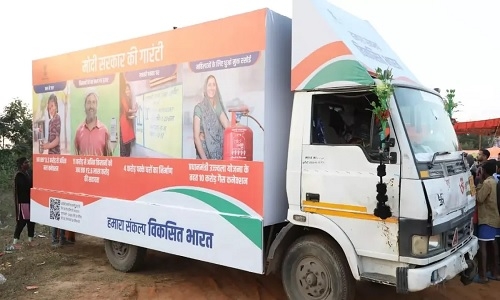Raj women flock Viksit Bharat camps for water, LPG connections
Date :10-Jan-2024

By Durba Ghosh
JAISALMER,
WOMEN from far-flung villages in Rajasthan’s Jaisalmer district are flocking to Viksit Bharat Sankalp Yatra (VBSY) camps for water and cooking gas connections, officials said. Many of them were seen getting themselves registered for water connections under the Jal Jeevan Mission and also visiting stalls of the PM Ujjwala Scheme for cooking gas. Water is a prized commodity in the Thar Desert, where women have to walk miles to fetch it from sources or spend considerable amounts on booking tankers, which are, however, never enough to meet daily requirements. At a VBSY camp at Sultana village close to the India-Pakistan border, local resident Kisni Devi said, “We have lost many animals due to scarcity of water. I have come here in the hope of getting a water connection.
The main livelihood for people here is farming and rearing of animals but water is not enough for either, she said. Cooking gas is also much sought-after in the arid region, where it is difficult to find firewood. “Most of the households in our village do not have gas connections. Though it is expensive, we want it as it saves time and also because it is difficult to find firewood in this barren land,” 36-year-old Rewri Devi said in another VBSY camp in Sonu village in the same district. Manohar Singh, local BJP leader of Sultana village, claimed that the announcement of the newly-elected Government of BJP that LPG cylinders will be available to beneficiaries for Rs 450 will be a “big help for women”.
Women also attended health camps and got themselves registered for Ayushman Bharat cards. Sunita Devi of Sonu village claimed she came to know about health cards only before the assembly polls and she, along with other women, immediately rushed to a camp in her village to get themselves registered. ASHA worker Rewati Devi claimed that women were receiving all maternal health benefits as health workers visit every household to ensure no woman or child is denied of the facilities. “We ensure that women and girls are provided with sanitary napkins and also regularly make them aware about health and hygiene,” she claimed.